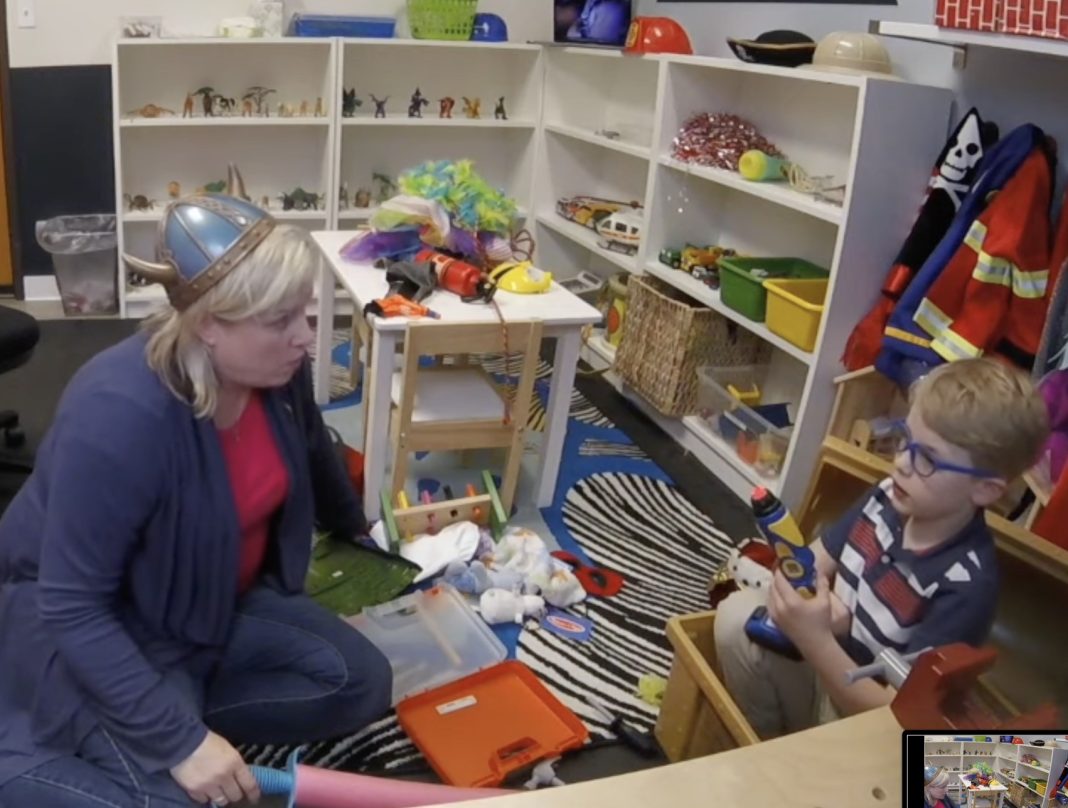The mental health of children and their parents is pressed to the max. Endless disruptions of routines with pandemic lockdowns, financial insecurity, housing shortages, topped off with wrenching national news has created circumstances where people are anxious and filled with dis-ease. Olympia Therapy works with children and their families to restore well-being and balance. Play Therapy is one modality.
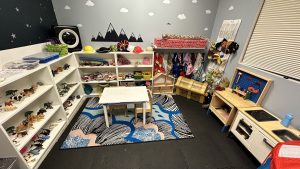
International Play Therapy Week is February 5-11. One might ask what does play therapy mean and wonder, “Is it even really therapy?” Olympia Therapy promotes and celebrates Play Therapy. Cary Hamilton, owner/director, wants people to better understand this healing option. She and her team support families to find solutions to the many challenges children and life offer up.
Understanding Play Therapy
“They think we are just playing,” says Cary. Many people don’t realize play therapy is an evidence-based practice that uses play, the natural language of children. “Playing is healing. It’s a biological need,” she explains. “The sports world is all play. We see the value of that,” Cary adds. We learn when we play games.
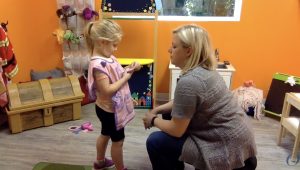
Kid’s brains are dramatically different than adults. The cognitive regions grow with age, not finishing till age 25. Cognitive/behavioral therapy is a top-down (cognitive on top) approach to changing behaviors. Play therapy is a bottom-up approach that works with the developing brain. It can effectively deal with many difficulties children face including the following:
- Trauma
- Cognitive disorders
- Social impairment
- Neurodiversity: Autism, ADHD, SPD
- Anxiety
- Life/Family Changes
- Depression
We want to believe that if we just talk to kids, they will change. Scientifically , children truly do not have the words to understand, integrate or deal with the issues. “Toys are their words and what they play out is their story,” she explains. Have you been with a child who recently got a vaccine shot in the arm? He or she might spend time after that pretending to give others a shot in the same manner. Play is the process they use to understand.
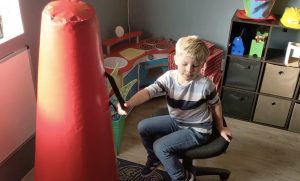
“Children innately will do what they have seen, experienced or what was done to them,” says Cary. What they express had to have been seen in reality or on TV. They don’t imagine it from thin air. A play therapy setting has specific toys that offer multiple levels and ways to communicate without needing words. There are art supplies, sensory calming tools, toy vehicles, and animals that can be animals or personifications of others. There’s a tent-like space where a child can go to feel safe and secure. “Items have purpose and intention,” explains Cary. “Their actions tell the clinician what they are needing.”
Interestingly, after a trauma, the ability to talk disappears first. Words do not come. The brain is on survival mode. Play is action. In the play therapy room children can leave a mess, curse, yell and do other behaviors not usually tolerated at home. Time is needed to develop a trusting relationship with the therapist. “We all want to be heard and understood,” states Cary. This includes adults too.
Children in a play therapy session get to use make believe to try on aspects of the world. Sometimes they may portray a good guy and sometimes the bad guy. “Children are mirrors of the adults around them,” she states. The anxiety, hostilities or deep worries within a family get expressed. Therapy is meant to facilitate understanding, healing and growth.
Play Therapist Credentials
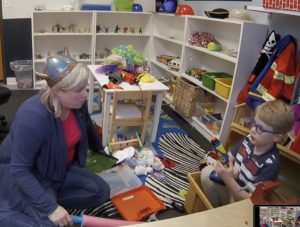
Olympia Therapy is proud of its clinicians who provide play therapy that is child-centered, evidence based and effective. Play therapist credentials are rigorous. To be a Registered Play Therapist (RPT) requires the following:
- Master’s degree or higher in mental health
- 2 years and 2,000 hours of clinical experience
- 3 years and 3,000 additional hours for RPT-S
- 150 hours play therapy clinical experience
- 50 hours of play therapy supervision
When Do You Seek Professional Help?
When dysfunctions are disrupting more than one area of life, such as both home and school, or when the intensity of a child’s behavior is a safety concern, it’s time to get outside help.
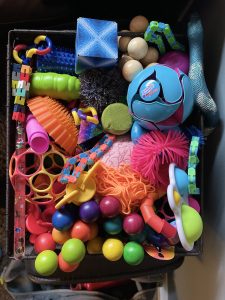
Everyone doesn’t need therapy, but everyone needs mental health! Here are Cary’s Top Three Tips for parents:
1 – Connect with your Child
Having dinner together is excellent but get off your devices and be with your kids. Play a game your child suggests. Do arts and crafts together and let it get messy. These activities decrease the cortisol levels in everyone’s bodies. You can take a walk, sit on the porch, listen to music, drink tea or play blocks on the floor. Give each other a manicure. Yes, it takes time. And yes, the benefits are huge.
2 – Be Present
The more your kids feel connected to you the more they will be willing to communicate. You get to practice this mantra, “I am here, I hear you, I understand, I care for you.” When kids are upset you get to be the soothing presence. You can sit quietly, hug or rock together. They need to feel you are with them, even in the hard times
3 – Get More Sleep
Kids are sleep deprived and tired. So are parents. You don’t have to be scheduled every day to be a good parent. We all need time and space to unwind and integrate the day. Sleep is the only time children really grow, and human brains clean out.
These days families are over-scheduled and have over-the-top expectations. And people wonder, “Why aren’t we having any fun?!” A parent’s role is not about living a power struggle with their kids. Olympia Therapy has education modules for parents, Playful Wisdom Parenting. Look on the Olympia Therapy website for upcoming groups, educational material and other information. And take some time to play! It’s good for the body, mind and spirit.
Sponsored







































